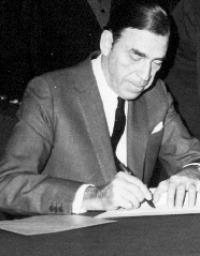Home | Office Holder | Charles Burke Elbrick
|
|
|
Elbrick was the son of Charles Elbrick and his Irish wife, Lillian Burke. He graduated with a leading Bachelor of Arts degree from Williams College in 1929, and narrowly missed selection for a Rhodes Scholarship. Having joined the United States Foreign Service in 1931, Elbrick was initially appointed Vice Consul in Panama. He continued on to Haiti and then acted as Third Secretary in Warsaw, Poland. In 1939, Elbrick had followed the Polish Government into exile. While leaving Warsaw in convoy, he was strafed by German planes. Elbrick returned to Poland in June 1945 to reopen the US Embassy. He was Chargé d'Affaires at the U.S. Embassy in Havana in 1951. He was promoted to Assistant Secretary of State for European and Eurasian Affairs in 1957. Thereafter, Ambassador Elbrick was variously the representative of the United States to Portugal (1958), Yugoslavia (1964), and Brazil (1969). In August 1968, when Soviet-led forces invaded Czechoslovakia, Elbrick, then Ambassador in Belgrade, was summoned by Marshal Tito to be asked what United States policy was toward Yugoslavia in such a moment. “The same as always,” Elbrick said. “To support Yugoslav independence and integrity. Do you need any help?“ ”Not now,” said Tito, thanking Ambassador Elbrick for inquiring. A year later, while stationed in Brazil, Charles Burke Elbrick was kidnapped for 78 hours by the Revolutionary Movement 8th October (MR-8) in Rio de Janeiro, on September 4, 1969. The incident formed the basis of the 1997 Bruno Barreto film Four Days in September (O Que É Isso, Companheiro?), starring Alan Arkin, Pedro Cardoso and Fisher Stevens. The storyline was adapted from the 1979 memoirs of Fernando Gabeira, former member of revolutionary cell MR-8 and later a journalist and congressman in Brazil's Green Party. After his release in exchange for 15 imprisoned leftists, Ambassador Elbrick coolly remarked, “Being an ambassador is not always a bed of roses.” In 1969, he was honored by the President of the United States with the 4-star rank of Career Ambassador, and, following his retirement in 1973, Ambassador Elbrick was awarded the Foreign Service Cup. Elbrick spoke Portuguese as well as Spanish, French and German, and was regarded as an expert on Iberia and Eastern Europe. |




 RSS
RSS